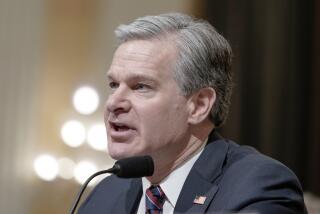Will ‘Root Out’ Spies, Reagan Says : A ‘New Realism’ Is Pledged to Meet Threat to Security
SANTA BARBARA — President Reagan, reacting to a wave of high-level espionage arrests, said Saturday that his Administration is approaching the increasing threat to national security “with a new degree of realism” and vowed to “root out and prosecute the spies of any nation.”
Although Reagan did not mention Israel by name, he was apparently alluding to the case of Jonathan J. Pollard, the Navy intelligence analyst who is accused of funneling U.S. classified information to Israel for a monthly stipend of $2,500.
“We’ll let the chips fall where they may,” he said in his weekly radio address.
“As events of recent days have made clear, many nations spy on the United States. The totality of this threat underscores just how important it is that we protect ourselves,” Reagan said.
Focuses on Soviet Bloc
Except for the warning aimed at Israel, Reagan’s remarks from his ranch near here concentrated on the more common threat from Communist countries.
Reagan said that he was seeking “a broad range of reforms and improvements” in the intelligence community. At the top of his list, he cited the reduction of hostile intelligence personnel within the United States.
America has far fewer diplomats in Soviet-Bloc nations than they maintain here. The Administration would like more of a parity than now exists as a way of cutting down the opportunities for espionage. The FBI estimates that 30% to 40% of the 2,500 Soviet-Bloc officials stationed in the United States are involved in intelligence work.
Reagan also cited the need for better monitoring of exchange programs, the improvement of government communications and personnel procedures, expanded counterintelligence capabilities abroad and better security at U.S. embassies and military bases around the world.
Can’t ‘Sugar-Coat Reality’
“We recognize that the KGB and others seeking to exploit the openness of our society are not 10 feet tall. Neither, however, are they midgets. We’re up against aggressive people who take their job seriously. There’s no reason to sugar-coat reality,” Reagan said.
“Some of you may be wondering if the large number of spy arrests in recent weeks means that we’re looking harder or whether there are more spies to find,” he said. “Well, I think the answer to both questions is yes.”
The number of “hostile intelligence officers” in the United States has grown sharply in recent years, Reagan said, their task made easier by the openness of a Western democracy compared to the tight restrictions on people and information in Communist societies.
But Reagan credited an Administration buildup of intelligence resources, people and “top-level attention” with bringing about the rash of recent arrests. Claiming “impressive results,” he said his Administration had apprehended 34 spies since 1981, compared to 13 arrests for espionage from 1975 to 1980.
However, there are indications that at least some of the latest arrests had more to do with information passed on by Soviet KGB officer Vitaly Yurchenko before he re-defected to the Soviet Union last month.
In addition, the sharp upturn in espionage cases in the last five years reflects in part a change in government policy during the Gerald R. Ford and Jimmy Carter administrations to prosecute spies rather than drop cases for fear of revealing secrets, intelligence and Justice Department sources said.
Efforts Stepped Up
Recent Administration initiatives have included commencement of a five-year buildup of counterintelligence resources, development of National Security Council machinery to review counterintelligence requirements and creation of an interagency staff to assess the threat from foreign intelligence services. The Defense Department has moved to tighten its security clearance procedures.
In the past, Reagan also said he was seeking better controls on foreign intelligence agents assigned to the United Nations who have used it as “a spy nest.”
But on Saturday, Reagan seemed to rebut suggestions that he take more restrictive measures, including treating current and former U.S. intelligence officers as “a suspect class” that should be strictly monitored to prevent national security disclosures.
“While our security is tied to protecting certain secrets,” he said, “there is no need to fight repression by becoming repressive ourselves.”
Democrats in Accord
In a response from congressional Democrats, broadcast from Washington, Rep. Steny H. Hoyer of Maryland pledged his party’s support for Reagan’s efforts to root out spies, declaring: “All nations should know that the Congress stands with the President, ready to commit the necessary resources to deter either internal or international breaches of our national security.”
More to Read
Sign up for Essential California
The most important California stories and recommendations in your inbox every morning.
You may occasionally receive promotional content from the Los Angeles Times.










